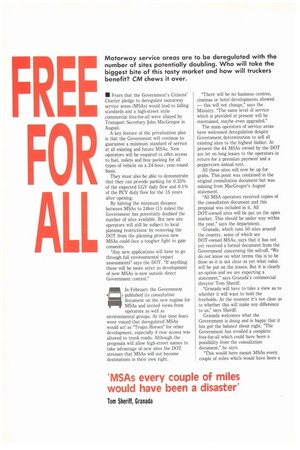FREE FOR ALL
Page 44

If you've noticed an error in this article please click here to report it so we can fix it.
I/ Fears that the Government's Citizens' Charter pledge to deregulate motorway service areas (MSAs) would lead to falling standards and a high-street style commercial free-for-all were allayed by Transport Secretary John MacGregor in August.
A key feature of the privatisation plan is that the Government will continue to guarantee a minimum standard of service at all existing and future MSAs. New operators will be required to offer access to fuel, toilets and free parking for all types of vehicle on a 24-hour, year-round basis.
They must also be able to demonstrate that they can provide parking for 0.35% of the expected LGV daily flow and 0.1% of the PCV daily flow for the 15 years after opening.
By halving the minimum distance between MSAs to 24km (15 miles) the Government has potentially doubled the number of sites available. But new site operators will still be subject to local planning restrictions: by removing the DOT from the planning process new MSAs could face a tougher fight to gain consents.
"Any new applications will have to go through full environmental impact assessments" says the DOT. "If anything these will be more strict as development of new MSAs is now outside direct Government control."
IMB In February the Government *
a .. published its consultation
document on the new regime for MSAs and invited views from environmental groups, At that time fears were voiced that deregulated MSAs would act as "Trojan Horses" for other development, especially if rear access was allowed to trunk roads. Although the proposals will allow high-street names to take advantage of new sites the DOT stresses that MSAs will not become destinations in their own right. "There will be no business centres, cinemas or hotel developments allowed — this will not change," says the Ministry. 'The same level of service which is provided at present will be maintained, maybe even upgraded."
The main operators of service areas have welcomed deregulation despite Government determination to sell all existing sites to the highest bidder. At present the 44 MSAs owned by the DOT are let on long leases to the operators in return for a premium payment and a peppercorn annual rent.
All these sites will now be up for grabs. This point was contained in the original consultation document but was missing from MacGregor's August statement.
MSA operators received copies of the consultation document and this proposal was included in it. All DOT-owned sites will be put on the open market. This should be under way within the year," says the department.
Granada, which runs 50 sites around the country, some of which are DOT-owned MSAs, says that it has not yet received a formal document from the Government concerning the sell-off. "We do not know on what terms this is to be done so it is not clear as yet what value will be put on the leases. But it is clearly an option and we are expecting a statement," says Granada's commercial director Tom Sheriff.
"Granada will have to take a view as to whether it will want to hold the freeholds. At the moment it's not clear as to whether this will make any difference to us," says Sheriff.
Granada welcomes what the Government is doing and is happy that it has got the balance about right. "The Government has avoided a complete free-for-all which could have been a possibility from the consultation document," he says.
"This would have meant MSAs every couple of miles which would have been a




















































































